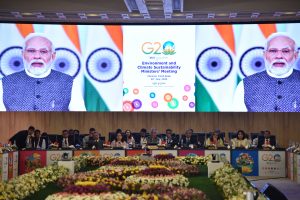Environmental activists have suffered a setback amid massive protests by Europe’s farmers against the push for organic farming. The protests that began in the Netherlands but spread to several other parts of Europe have shaken the continent threatening its food security amid swift geopolitical shifts driven by the Russia-Ukraine conflict.
Earlier this month, the US Supreme Court ruling against the Environment Protection Agency (EPA), limiting its authority to regulate carbon dioxide emissions from power plants, also dealt a blow. Not just that. The European Parliament also approved inclusion of gas and nuclear as sustainable energy sources.
Last month, the Netherlands announced plans for a 22 billion Euro programme to cut nitrogen and ammonia emissions by 50-70 per cent nationwide by 2030, to comply with European Union regulations on nitrate pollution.
The move angered the country’s farmers, who blocked roads and ports with their tractors. A banner in Dutch read, “We can no longer be stopped.”
Experts told India Narrative that it is imperative to move towards green energy but the process has to be well thought through and gradual.
“Renewables need to be prioritised and fast-tracked but not at the cost of conventional fuels like oil, gas, and coal. The world will need to handle this energy transition scientifically and not emotionally,” Narendra Taneja, leading energy expert, told India Narrative.
He added that even a small mistake can disrupt equilibrium and cause a serious energy crisis.
Sri Lanka, home to 22 million people, was the first to make a pitch for switching to organic farming but the result has been disastrous for the country. While several factors led to the bankruptcy of the country, switching to organic farming was one of the prominent ones.
“It’s easy to forget in this meltdown, but the economic turmoil that has brought the South Asian nation to this point was precipitated by its disastrous shift to organic farming—posing new questions about the viability of sustainable agriculture,” the Time magazine wrote.
It further said that with the World Food Programme indicating that about 193 million people are facing acute food insecurity, “fast and easy access to foodgrains cannot be overemphasized.”
While organic farming releases a lesser amount of greenhouse gases, it can lead to a substantial reduction in food production. “Can we afford that at a time when threats of food insecurity across the world are rising,?” a farmer based in India’s Uttar Pradesh said.
Unsurprisingly, the decision of the European Parliament and the US Supreme Court have not been taken well by the environmentalists.
“The European Parliament just voted to label fossil gas as ‘green’ energy. This will delay a desperately needed real sustainable transition and deepen our dependency on Russian fuels. The hypocrisy is striking, but unfortunately not surprising,” environmental activist Greta Thunberg tweeted.
The ruling by the United States Supreme Court against the EPA is “a setback in our fight against climate change,” UN Spokesperson Stéphane Dujarric said.
Also read: India has met target of 10% ethanol blending in petrol 5 months ahead of schedule, says PM Modi
After the Ukraine war, is Europe now staring at a food crisis?




















